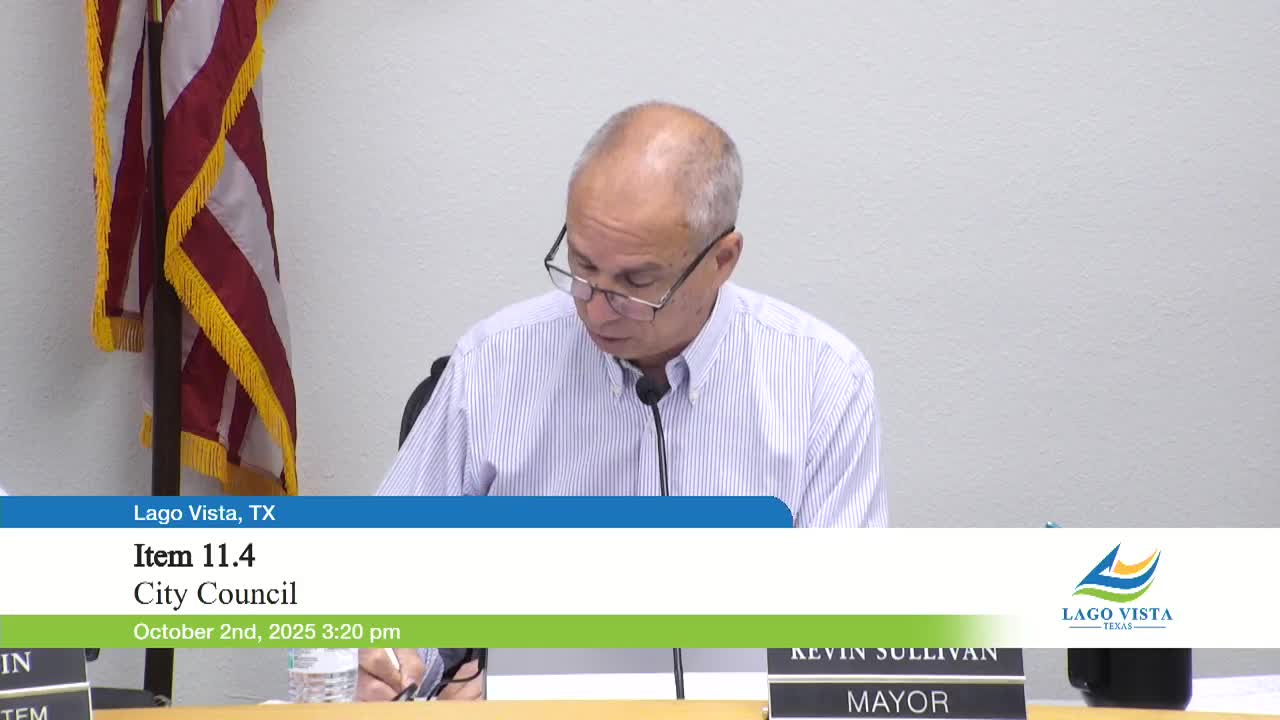Accenture briefs Lago Vista council on public‑private partnership (P3) options for water projects
October 02, 2025 | Lago Vista, Travis County, Texas
This article was created by AI summarizing key points discussed. AI makes mistakes, so for full details and context, please refer to the video of the full meeting. Please report any errors so we can fix them. Report an error »

Accenture consultants briefed the Lago Vista City Council on Oct. 2 about public‑private partnership (P3) and DBFOM delivery options for funding and delivering large water and wastewater projects. The firm described P3s as a tool, not a one‑size solution, and urged the city to adopt guidelines, run a value‑for‑money analysis, and consider bundling projects to attract private capital.
What Accenture presented: Lanita McCauley Bates, Accenture senior vice president for program management, outlined DBFOM (design, build, finance, operate, maintain) and related procurement approaches and said P3s offer: access to private capital, risk transfer (operators and builders assume certain performance risks), life‑cycle cost discipline with enforceable KPIs, and opportunities for innovation and faster schedules. Accenture noted DBB (design–bid–build) and CMAR (construction manager at risk) remain appropriate for many projects and contrasted them with DBFOM’s higher capital cost but single‑point accountability.
When it makes sense: Accenture recommended P3s when projects are large enough (bundling several projects can help meet private‑sector interest), there are clear service‑output requirements, stable revenue or payment mechanisms, and strong schedule pressure. The firm suggested a $50M sweet spot in some markets but said recent market dynamics have lowered private thresholds and increased capital availability.
Steps Accenture recommended: (1) program validation and scoping across a 5–15 year pipeline; (2) delivery screening/value‑for‑money analysis to confirm P3 is better than DBB/CMAR; (3) adopt P3 governance and procurement guidelines before seeking proposals; and (4) potential procurement and financing options, including partial service partnerships.
Council questions and context: Councilmembers asked for concrete examples and for local relevance. Accenture cited San Antonio Water System’s multi‑project use of P3s and the experience of other U.S. utilities, and said P3s do not necessarily privatize assets — municipalities can retain ownership and oversight but buy equity or services. Accenture also flagged bankability requirements, enforceable KPIs and the need for careful risk allocation.
Council direction: Councilmembers asked staff to discuss the presentation with public works and with Garver/other engineers, and to arrange follow‑up conversations with San Antonio Water System for more detail. No commitment to a procurement path was made; council asked staff to return with a proposal for next steps if the city wishes to continue exploring P3s.
Ending: Accenture left detailed guidance for a program‑level review and emphasized that a P3 is one of several delivery methods; the next council acts depend on staff evaluation and possible follow‑up briefings with peer utilities.
What Accenture presented: Lanita McCauley Bates, Accenture senior vice president for program management, outlined DBFOM (design, build, finance, operate, maintain) and related procurement approaches and said P3s offer: access to private capital, risk transfer (operators and builders assume certain performance risks), life‑cycle cost discipline with enforceable KPIs, and opportunities for innovation and faster schedules. Accenture noted DBB (design–bid–build) and CMAR (construction manager at risk) remain appropriate for many projects and contrasted them with DBFOM’s higher capital cost but single‑point accountability.
When it makes sense: Accenture recommended P3s when projects are large enough (bundling several projects can help meet private‑sector interest), there are clear service‑output requirements, stable revenue or payment mechanisms, and strong schedule pressure. The firm suggested a $50M sweet spot in some markets but said recent market dynamics have lowered private thresholds and increased capital availability.
Steps Accenture recommended: (1) program validation and scoping across a 5–15 year pipeline; (2) delivery screening/value‑for‑money analysis to confirm P3 is better than DBB/CMAR; (3) adopt P3 governance and procurement guidelines before seeking proposals; and (4) potential procurement and financing options, including partial service partnerships.
Council questions and context: Councilmembers asked for concrete examples and for local relevance. Accenture cited San Antonio Water System’s multi‑project use of P3s and the experience of other U.S. utilities, and said P3s do not necessarily privatize assets — municipalities can retain ownership and oversight but buy equity or services. Accenture also flagged bankability requirements, enforceable KPIs and the need for careful risk allocation.
Council direction: Councilmembers asked staff to discuss the presentation with public works and with Garver/other engineers, and to arrange follow‑up conversations with San Antonio Water System for more detail. No commitment to a procurement path was made; council asked staff to return with a proposal for next steps if the city wishes to continue exploring P3s.
Ending: Accenture left detailed guidance for a program‑level review and emphasized that a P3 is one of several delivery methods; the next council acts depend on staff evaluation and possible follow‑up briefings with peer utilities.
View full meeting
This article is based on a recent meeting—watch the full video and explore the complete transcript for deeper insights into the discussion.
View full meeting
